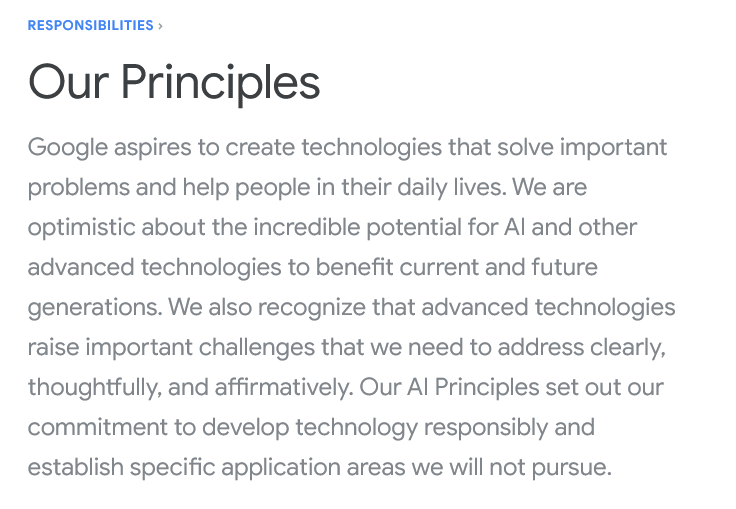Google’s AI Principles: A Commitment to Responsible Innovation
The rise of AI technology has sparked a global conversation about the ethical implications of its development and use. In response, Google published a set of AI principles in 2018 to guide responsible and ethical AI development. As we move into 2023, it’s important to take a closer look at the latest updates to Google’s AI principles and their impact on the future of AI ethics. As an AI expert, it’s crucial to understand how these principles shape the development and use of AI technology and the role they play in building trust between society and AI systems. Join us as we explore the latest developments in Google’s AI principles and their implications for the future of AI ethics.
The Google AI Principles
Artificial intelligence (AI) has become an increasingly important part of our lives, from personal assistants to self-driving cars. As a leading innovator in the field, Google has recognized the need for responsible innovation and has established AI principles to guide its development and use of AI.
Google’s AI principles are based on five key values: be socially beneficial, avoid creating or reinforcing unfair bias, be built and tested for safety, be transparent and explainable, and be accountable. These principles guide the development, use, and implementation of AI at Google and help ensure that AI is used for the benefit of society.
- Be Socially Beneficial
Google is committed to using AI for the benefit of society. This includes developing AI that can help solve some of the world’s biggest challenges, such as climate change, healthcare, and education. Google also aims to ensure that AI is accessible to everyone, regardless of their background or geographic location.
- Avoid Creating or Reinforcing Unfair Bias
Google recognizes that AI can perpetuate biases that exist in society. As such, it is committed to developing AI that is fair and unbiased. This includes using diverse data sets, testing for biases, and regularly evaluating and updating its AI systems to ensure they do not reinforce existing biases.
- Be Built and Tested for Safety
Safety is a top priority for Google when it comes to AI. Google is committed to developing AI that is safe, reliable, and resilient. This includes building robust testing frameworks, conducting thorough risk assessments, and ensuring that AI systems can be easily audited and modified as needed.
- Be Transparent and Explainable
Google recognizes the importance of transparency and explainability in AI. Google aims to develop AI that is transparent, allowing users to understand how it works and how decisions are made. This includes providing explanations for decisions made by AI systems and making information about AI systems available to the public.
- Be Accountable
Google is committed to being accountable for the use of its AI. This includes establishing clear lines of responsibility and accountability for AI development and use, ensuring that AI is used ethically and responsibly, and regularly evaluating and updating its AI systems to ensure they meet its principles.
Conclusion
Google’s AI principles are a commitment to responsible innovation in the field of AI. By adhering to these principles, Google aims to ensure that AI is used for the benefit of society and that it is developed and used in a way that is fair, safe, transparent, and accountable. If you’re interested in learning more about Google’s AI principles, visit the Google AI website today.

A.I. is our Artificial Intelligence Bot that offers the best of all search marketing and paid advertising strategies here are AI Stratagems.
